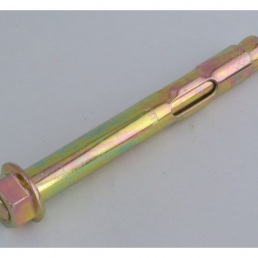Anchor bolts are an essential part of concrete masonry construction. They provide stability and prevent the masonry from moving or shifting. Anchor bolts should be installed in a specified sequence and location to ensure proper installation and structural integrity. We’ll go through an overview of eBolts’ concrete anchor bolts and their installation requirements.
Types of concrete masonry anchor bolts
Masonry bolts are one of the most common methods of anchoring a concrete structure to masonry. Masonry bolts are available in two main types: expansion and undercut. Expansion bolts rely on the outward force created by a nut as it is tightened to pull the bolt head against the wall, wedging it tightly in place. Undercut bolts have a specially designed shank that allows them to be hammered into the mortar joint, leaving a small bolt section exposed above the surface. This section is then cut off with a chisel, leaving only the threaded portion of the bolt embedded in the masonry.
Uses for concrete masonry anchor bolts
Concrete masonry anchor bolts are used in a variety of applications. Some common uses are:
1) Securing a metal frame to a concrete foundation. The anchor bolts help secure the frame in place and keep it from shifting or moving.
2) Connecting pieces of masonry. The anchor bolts help keep the masonry together and prevent it from falling apart.
3) Securing a metal roof to a concrete foundation. The anchor bolts help keep the roof in place and prevent it from shifting or moving.
Installation of concrete masonry anchor bolts
Installation of a concrete masonry anchor bolt requires the following:
- Determine the hole size and placement.
- Drill the hole to the correct depth.
- Insert the anchor bolt into the hole.
- Tap the anchor bolt into place with a hammer.
- Apply concrete around the anchor bolt, ensuring to fill in any gaps between the anchor bolt and the masonry wall.
Concrete Masonry Anchor Bolts vs. Other Anchors
At eBolts, our Concrete Masonry Bolts are a great way to secure objects to a concrete surface. They are available in various sizes and shapes and can be used in indoor and outdoor applications. Masonry bolts are designed to bite into the concrete, providing a solid anchor point.
Many different types of anchors are available on the market, but none provides the same level of security as a concrete anchor bolt. Other anchors, such as toggle bolts or expansion bolts, rely on the surrounding material to provide support. This can often lead to failure, especially in applications with little or no redundancy.
Concrete masonry anchor bolts are the best option for securing objects to concrete surfaces. They provide a solid anchor point that is resistant to failure, making them ideal for indoor and outdoor applications.
Why use concrete masonry anchor bolts?
Concrete masonry anchor bolts are essential to any concrete or masonry project. They provide a reliable way to attach metal hardware to a concrete or masonry surface. There are many anchor bolts, but the concrete masonry bolt is the most common.
Concrete masonry anchor bolts attach metal hardware to a concrete or masonry surface. The most common type of concrete masonry anchor bolt is the mushroom-head bolt. Mushroom-head bolts are available in two main styles: expansion and undercut. Expansion bolts work by expanding as they are driven into the material. The head of the bolt splits and spreads out, gripping the sides of the hole tightly.
Undercut bolts have a U-shaped groove around the head of the bolt. At eBolts, we have excellent concrete anchor bolts and masonry bolts. Contact us today to get best quality masonry bolts.
Concrete Masonry Anchor Bolts
Showing the single result



